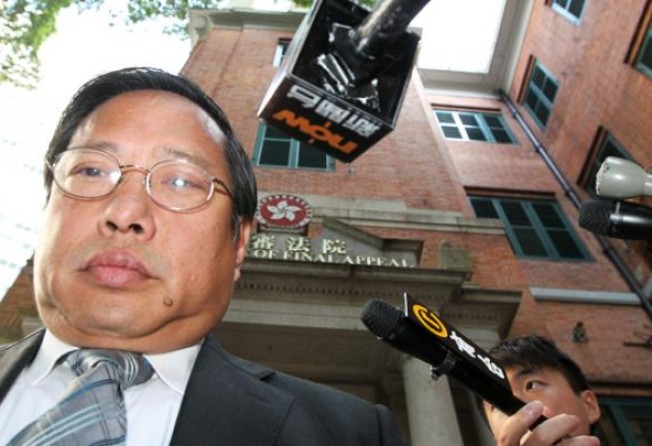Albert Ho’s challenge to Leung Chun-ying's election victory quashed

Almost eight months after the chief executive election, the court challenge against Leung Chun-ying’s March 25 victory at the polls was quashed in the Court of Final Appeal, on Tuesday morning.
The three-judge panel denied permission to two lawmakers – the Democratic Party’s Albert Ho Chun-yan and League of Social Democrats’ “Long Hair” Leung Kwok-hung – to pursue their challenge by appealing against an earlier verdict that dismissed their case.
Tuesday’s judgment said: “We conclude that the crucial aspects of the challenges asserted by Mr Ho against [Chief Executive] Mr C Y Leung’s election are not reasonably arguable and that such challenges must therefore be brought to an end.”
The judges were Chief Justice Geoffrey Ma Tao-li, Mr Justice Roberto Ribeiro and Mr Justice Robert Tang Ching.
Ho and Leung Kwok-hung claimed the chief executive was not duly elected because he made false statements before and during the campaign. He denied having illegal structures at his home on The Peak, but was later proved wrong.
The legal challenge received a setback in October, in the Court of First Instance, when Mr Justice Johnson Lam Man-hon ruled that it had no real prospect of success. Therefore, Lam ruled, the court would not exercise its discretion to extend a seven-day deadline for filing an election petition.
Ho, the former Democratic Party chief who finished third in the election, missed the deadline by several months.
Reacting to the ruling, Ho said he was “not particularly surprised” by it, and vowed to continue to press the chief executive to come clean on the unauthorised structures at his Peel Rise residence. His party colleagues would follow up on the matter in Legco, he said.
“Although Leung escaped from the election petition, [which could be] a calamity for him – he will still need to face the media, public opinion, and the Legislative Council’s query,” Ho said.
Leung Kwok-hung reacted to the ruling by quoting from the Basic Law and saying: “the chief executive must be someone with integrity. [This ruling] could be dangerous because it could imply that all chief executive contestants can do all sorts of bad things the day before his election campaign started.”
The two lawmakers had applied for leave to appeal against Lam’s decision not to strike down the seven-day deadline as unconstitutional.
On that point, the top judges wrote: “Assuming … that the time limit was unconstitutional because it was too strict, the suggestion that [Lam] should have simply struck it down, leaving no time limit whatsoever for lodging election petitions is irrational, contrary to the self-evident legislative intent and impossible to justify in the public interest.”
“The relevant intent of the legislature … is plainly and obviously to provide a mechanism for arriving at a clear-cut lawful election result with a minimum of delay, avoiding any damaging period of prolonged uncertainty,” the judges wrote.
“It would be completely at odds with that policy for the court to take it upon itself to abolish the time limit altogether.”
Ho further lost in his attempt to appeal against Lam’s finding that the case had no real prospect of success. The top court said it would be “contrary to common sense and the interest of justice” to grant an extension if there was no real prospect of success on the merits of the case.
Central to the lawmakers’ petition was whether Leung Chun-ying made a false statement when he attacked election rival Henry Tang Ying-yen, during a televised debate over illegal structures at Tang’s Kowloon Tong home.
Ho claimed that by criticising Tang, Leung implied he himself had made no unauthorised alterations to his own house. In June – almost three months after Leung won the election – the media exposed six unlawful structures at the victor’s home.
The top court ruled that there was a “fundamental flaw” in the argument that Leung’s televised attack on Tang meant he had no illegal structures at his own home.
“[That] is a very different thing from saying that the meaning of [Leung’s] statement denigrating Mr Tang was a claim that he … did not have any [unlawful building works] at his residence,” the judges wrote.
The judges wrote that they would not deal with the other issues in the case, given their conclusion that Ho’s challenge should not proceed further. They also dismissed Leung Kwok-hung’s application on the same grounds.
However, the judges did grant the two lawmakers leave to appeal certain aspects of the case on an “academic status” – just to clarify the law, because of the high level of public importance involved. But that appeal will not affect the election outcome.
This clarification exercise may look into the relationship between challenges to a chief executive election by way of an election petition, under the Chief Executive Election Ordinance, and a challenge by way of a judicial review.
The two lawmakers were also allowed to appeal academically as to whether the seven-day time limit on filing an election appeal infringed the right of access to a court guaranteed by the Basic Law.
The top court also gave Ho and Long Hair leave to appeal against the costs orders made by Lam.